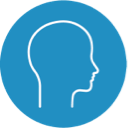The right migraine treatment can make all the difference
TALK with your healthcare provider about the best treatment to help relieve your symptoms
If you have headache accompanied by impact on your daily activities, sensitivity to light, and/or nausea
1 or more days per month

acute treatment is recommended.*
If you have headache accompanied by impact on your daily activities, sensitivity to light, and/or nausea
4 or more days per month

acute and preventive treatment is recommended.*
*Recommended medications refer to those with established/probable efficacy as identified by the AAN/AHS guidelines and the AHS position statement regarding new migraine treatments.
Treatment goals

The goal of acute treatment includes:
-
TREAT migraine attacks when they happen
- Restore ability to function

The goal of preventive treatment includes:
-
Stop migraine attacks before they happen
- Reduce migraine attack frequency
Before choosing the proper treatment for you, your healthcare provider may ask you the following questions:
- How long have you been experiencing headache and accompanying symptoms?
- How many headache days are you having each month?
- How many days in a month does headache impact your life?
- Have you been treated for headache or migraine before?
- Did you stop taking that treatment? If so, why?
While there are 2 types of migraine treatment, there are many different classes of migraine medications. TALK with your healthcare provider to learn about the types and which might be appropriate for you.
| Acute Treatments | Preventive Treatments |
|---|---|
Acute Treatments:
| Preventive Treatments:
|
Note that use of specific medications like those used to treat depression or epilepsy does not mean that you have that disorder or that it is the cause of your migraine. Many classes of medications are often used to treat more than one type of disease or disorder.
Talking about the impact headache has on your life can lead to more accurate diagnosis and help your healthcare provider find the right treatment for you.
*For chronic migraine only.
AAN=American Academy of Neurology; AHS=American Headache Society.
Managing Migraine Disease
Use this helpful guide to help you understand migraine
